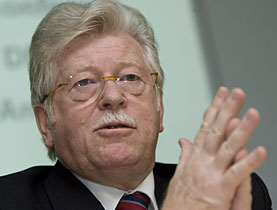Aid chief takes stock as he bows out

The outgoing director of the Swiss Agency for Development and Cooperation (SDC), Walter Fust, says he is leaving behind an organisation in excellent shape.
In an interview with swissinfo, Fust rejects criticism that the SDC is in need of reform, and mismanaged projects to benefit tsunami victims in southeast Asia four years ago.
Fust, who will step down at the end of the month, has led the SDC since 1993. He will become head of the Global Humanitarian Forum in Geneva, which brings together major players in the humanitarian field and discusses strategies on humanitarian assistance.
swissinfo: What would you say was the most important contribution you made to the SDC during your 15-year term?
Walter Fust: Internal governance. In other words the consolidation of the various fields in which we work; humanitarian aid, cooperation with eastern European states and bilateral and multilateral development.
swissinfo: You were responsible for managing a multi-billion franc budget. How powerful is the director of the SDC?
W.F.: I’m neither powerful nor am I a king as some people think. First of all, it’s a great responsibility. The mandate was handed to me by the cabinet and is monitored by parliament.
I do have some scope in its implementation. I used this freedom to achieve the SDC’s goals but always by following the guidelines to the letter. I am powerful in this way but not as an individual.
swissinfo: Why does Switzerland only devote 0.4 per cent of Gross Domestic Product to development aid when the United Nations says the figure must be at least 0.7 per cent if the Millennium Development Goals are to be met?
W.F.: The international community agrees that 0.4 per cent is insufficient. But the cabinet is exposed to practical constraints.
I’m appreciative that the government envisages a budget increase for development aid of 3.3 per cent over the next seven years. Compared with other federal funding areas, we’re at the top.
swissinfo: The cabinet recently renewed the credit for the development division of the State Secretariat for Economic Affairs (Seco). Would it not have made more sense, as was proposed, to have merged the two units under the wing of the SDC?
W.F.: It’s obvious to me that the government should have one office responsible for international cooperation. It’s a question of political will and economics with the aim of keeping costs of services as low as possible.
swissinfo: The news magazine, Weltwoche, harshly criticised the SDC for its efforts assisting victims of the Asian tsunami at the end of 2004. Weltwoche mockingly referred to villages built by the SDC as “ghost towns”. Is this an accurate depiction?
W.F.: Independent experts in the region discovered that the journalist behind the story visited villages on the Thai island of Koh Phra Thong during the holiday period, and he found houses of nomads empty because they were away at sea for two months.
swissinfo: The same magazine accused the SDC of mismanagement and bad planning in connection with aid to tsunami victims in Sri Lanka.
W.F.: We also asked independent experts to look into the situation there. They certified that we produced excellent results.
I must emphasis that former employees of charities and the SDC were behind these denunciations. The problems have always been resolved while remaining true to our principles.
swissinfo: Your successor Martin Dahinden has been presented as a man with exceptional management qualities. Reading between the lines, does this mean the SDC is in need of reform?
W.F.: One must have these qualities to run the SDC. The SDC is in excellent shape and I’m pleased to hand it over in this condition to my successor.
Managers must anticipate future developments. He will without a doubt have to set new priorities to conform to these changes.
We have over the past 15 years constantly changed, adapted and reviewed our portfolios. My successor will have to do that too.
The SDC is certainly not in a crisis situation. An audit of the management of 60 federal offices last year placed the SDC in the top five. That is a good testimonial.
swissinfo-interview: Renat Künzi
Fust was born in 1945. He graduated with a Master’s Degree in political science from St Gallen University.
He entered the diplomatic service in 1975 and held assignments in Bern, Geneva, Baghdad, and Tokyo. From 1984 to 1986, he was personal adviser to the economics minister and in 1986 he was elected Managing Director of the Swiss Office for Trade Promotion.
He served as secretary general of the interior ministry from 1990 to 1993 when he became director of the SDC.
Fust is a member of various boards of international organisations and last year was named to head the new Global Humanitarian Forum Geneva.

In compliance with the JTI standards
More: SWI swissinfo.ch certified by the Journalism Trust Initiative












You can find an overview of ongoing debates with our journalists here . Please join us!
If you want to start a conversation about a topic raised in this article or want to report factual errors, email us at english@swissinfo.ch.